Olympics 2008: National Aquatics Centre (The Water Cube)
Monday, 11th August 2008 by Alex Turnbull
This is the brilliantly bizarre-looking National Aquatics Centre, which is better known as The Water Cube. The building is perhaps best described as resembling some sort of "bubble cake", and when it's lit up, it looks pretty incredible.
During the Beijing Olympics the centre will host the Swimming, Diving and Synchronised Swimming events, and is situated within Olympic Green, right next to the Bird's Nest Stadium where the opening ceremony was held on Friday.1
The design of the steel space-frame that makes up the building is actually based on a theory originally posited by great Victorian physicist Lord Kelvin. The idea was further developed in the 90s, and suggests that a combination of dodecahedra and tetrakaidecahedra (12 and 14-sided shapes respectively) can be used to divide space into cells of equal volume with the least surface area between them. In the case of the aquatic centre, thus maximising the amount of light entering the building, and helping to reduce the cost of heating the pool!
The frame is wrapped in a transparent form of Teflon called ETFE, and the building is the largest ETFE clad structure in the world - bigger even than the world's largest greenhouse, the previously featured Eden Project. ETFE allows more light and heat penetration than traditional glass - apparently accounting for an equivalent 30% decrease in heating costs.
More about the National Aquatics Centre at Wikipedia, and an informative article about theoretical physics is available from The Guardian.
-
It's worth noting that in the light of what we saw during the ceremony, it's now clear that the Google Images actually captured rehearsals underway! The globe which rose from the centre of the stadium is clearly visible appearing from a huge trapdoor in centre of the stadium. If you didn't see the ceremony, here's a picture for comparison. ↩︎
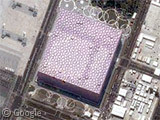
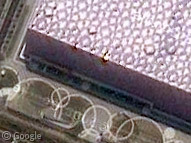
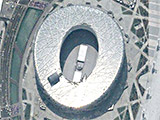
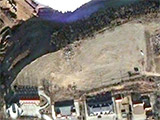
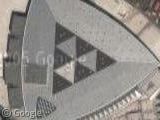
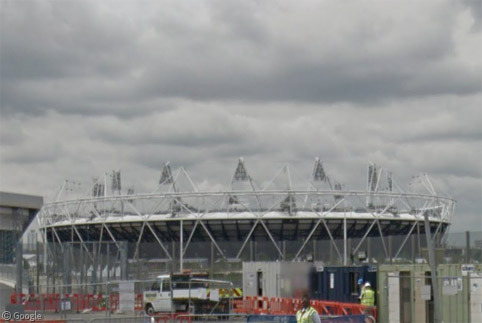
I though the name had been changed to The Phelps Cube. 🙂
“Well done, Michael Phelps. I wonder how many Carl Lewis would have won if there were medals for running in slightly different, inefficient ways.”
(Jon on http://news.bbc.co.uk/sport1/hi/olympics/live_action/7557665.stm @ 1018)